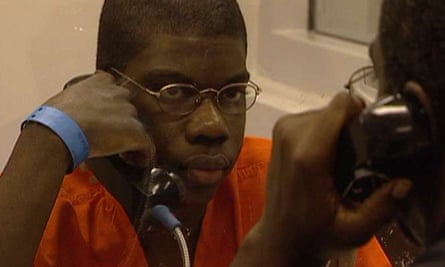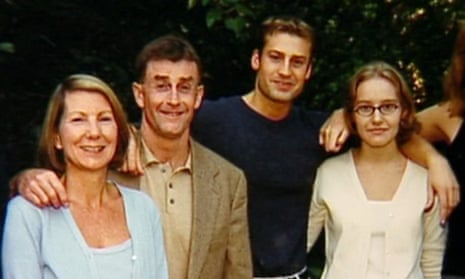The story of The Staircase is a long and twisty one. Kathleen Peterson, a wealthy business executive, was found in a bloody heap at the bottom of the stairs at her home in Durham, North Carolina, on the night of 9 December 2001. Her husband, Michael Peterson, a writer, was charged with her murder. The Staircase, Jean-Xavier de Lestrade’s extraordinary documentary series, follows the build up to the trial, how it all unfolds in the courtroom and its aftermath.
De Lestrade’s previous work, Murder on a Sunday Morning, was a two-hour film about a teenager accused of murdering a woman in Jacksonville, Florida. After its success (it won the 2001 documentary Oscar), HBO asked for more. De Lestrade was keen to find a very different kind of case from that of a poor black kid (who was acquitted after his public defender proved police had lied and beaten a confession out of him).
“I wanted to find a case which would involve a wealthy white man, well-known in his own community, who could afford a well-known defence lawyer,” says De Lestrade. “To look at the opposite end of the justice system, to see if he is treated differently.” After researching more than 400 cases, he heard about Peterson, went to see him, his lawyer David Rudolph as well as the prosecutor, the District Attorney.

De Lestrade had a feeling they were on to something. “Michael Peterson was a very good character. I well remember the first time I met him – he was talking about his wife Kathleen and you could really feel that he was deeply in love with her. And at the same time, I also had the feeling that he was like … I felt he was guilty of something. It was not too clear.” De Lestrade, who explained to Peterson that the purpose of the film was not to establish his innocence but to study the justice system, says he didn’t know if Peterson had killed his wife. And he still doesn’t.
It’s hard to write about The Staircase without spoilers. But Peterson was even more interesting than De Lestrade realised at that stage – because of his secret private life, because of something that had happened many years before in Germany, because of things he’d made up, because of things he’d written in his newspaper column. The prosecution were saying Peterson was an evil liar, that his whole life was a lie, and that’s when De Lestrade really knew he had something interesting. “Peterson was not prosecuted because they had enough evidence to prove he was guilty, but because of his way of life and the kind of man he was. The DA really wanted to get him.”
The case – and the series, which is about to launch on Netflix – has just about everything: tragedy, corruption, disinterment, perjury, politics, some very interesting extended family dynamics, extraordinary access and brilliant characters (not just Peterson, a mystery in himself, but also David Rudolf, the lawyer). Plus an awful lot of blood spatter analysis.
After 22 months of shooting, De Lestrade knew he had more than could ever fit into a single two-hour film, which is what he’d agreed with HBO. He wanted to do an eight-episode series. HBO weren’t keen, De Lestrade went elsewhere and found distribution in many countries, with the BBC’s Storyville strand airing it in 2005. And so a television genre, actually more of a cultural phenomenon, was born, one that became known as the true crime series. Making a Murderer, OJ: Made in America, The Keepers and many more – they all owe a debt to The Staircase.

Ask anyone under 35 what they watch, says De Lestrade, and they’ll tell you series – and this has expanded from episodic fictional dramas to documentaries. “Because it’s real life, real people, the emotions are I think stronger than in fiction. You live with the characters, go to work with them, to the bedroom. It becomes a kind of addiction.”
There’s a danger, for the makers of true crime series, that they can become dealers, profiting from and feeding that addiction. De Lestrade is very aware of that. “For me it should not be an entertainment. You have to be careful because it’s people’s lives. You need to have a strong purpose. It’s not just about a crime – did he kill her or not? It has to tell you something about the kind of society and world you’re living in.”
The Staircase is a study, by an outsider, of the American justice system – or rather a continuation of the study that started with Murder on a Sunday Morning. “To me the justice system is a starting point to look at how democracy functions,” says the film-maker, who studied both law and journalism. “Supposedly the US is a great democracy. That’s why I wanted to look at both sides, the poor black kid and the rich white man, and how the system treats them.

“In the Peterson case, there are two important things I observed. The first is that the institution is not there to find the truth. It’s more like a game, a chess game. And the second is that when you are caught in the system, it doesn’t matter how much money you have. If the system wants to catch you, they can.”
De Lestrade again stresses that he doesn’t know if Peterson killed his wife, if it was an accident, or even if – as was later suggested – her injuries, lacerations of the scalp and huge loss of blood, were the result of an attack by a large owl. But he does believe that Peterson wasn’t treated fairly. “Such things should not happen in a democracy. It’s shocking, really shocking.”
The story became a big part of De Lestrade’s life. “Yes, it’s been a real obsession. There’s always been a little piece of The Staircase in my head,” he says. After the initial eight episodes, he made a couple of further episodes in 2012, because of further developments in the case. Then in 2016, he began work on a further follow-up that was picked up by Netflix and became three more episodes.
The streaming service will now launch the entire 13-episode run. For the first time, The Staircase can be seen in one place, in its entirety. And, unsurprisingly, De Lestrade is very happy about this. “Until now, no one could watch it all in one night – well, a very long night – as a series. I know that many people have never heard of The Staircase. I’m glad it will be possible for a young audience to see it.”
De Lestrade has lost count of the number of journeys he’s made to Durham, North Carolina, sometimes on trips that resulted in nothing. In the course of 16 years, he estimates he’s filmed 1,132 hours – or 47 days – of footage. That time span adds a dimension to The Staircase you don’t often see in a documentary: the characters age, a revelation that’s not too much of a spoiler.
Nor does it spoil anything to say I think you should watch it. It’s an astonishing piece of work, a painstaking examination of a fascinating case, with brilliant characters and a few chilling lessons about the world we live in. The last time I became this involved in a case, I was actually part of the jury.

Comments (…)
Sign in or create your Guardian account to join the discussion